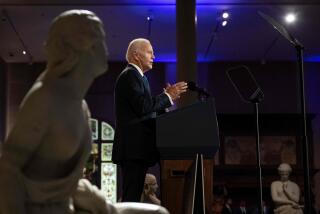NEWS ANALYSIS : U.S. Policy Hinges on Gorbachev’s Reforms, Lithuania : Diplomacy: Setting the summit date showed confidence in the Soviet leader and underscored Bush’s hopes for progress on key issues.
WASHINGTON — This week’s U.S.-Soviet talks demonstrated more clearly than ever that the success of U.S. policy toward the Soviet Union depends in turn on the success of Soviet President Mikhail S. Gorbachev’s efforts to reform his country and, more immediately, to settle peacefully the Lithuanian crisis and other ethnic turmoil.
“We are telling them . . . don’t use force,” President Bush told a group of newspaper editors after meeting with Soviet Foreign Minister Eduard A. Shevardnadze in the final hours of Shevardnadze’s three-day visit to Washington.
“Dialogue, discuss, (but) do not use force, because we have an awful lot at stake in the U.S.-Soviet relationship, an enormous amount at stake,” Bush said in an almost pleading tone. “It gets into arms control, human rights, the exodus of Soviet Jews, regional (Third World) questions . . . and the peace of an emerging democratic Europe. I want to keep that going.”
Bush’s decision this week to set dates of May 30 to June 3 for his second summit with Gorbachev was a significant show of confidence in the Soviet leader’s pledge not to violently suppress Lithuania’s independence bid. It also moved the superpowers past the tensest period in U.S.-Soviet affairs that has occurred so far during the Bush Administration.
Fixing the summit dates, if nothing else, tells the Lithuanians that the United States is very reluctant to champion their cause at the expense of its new relationship with Moscow. To some extent, it recalled the Soviet decision to welcome former President Richard M. Nixon to Moscow in 1972 even as U.S. planes were bombing Moscow’s Vietnamese allies.
Indeed, there may have been a slight but noticeable U.S. tilt toward Moscow, and away from Lithuania, during the Shevardnadze visit.
Secretary of State James A. Baker III, for example, endorsed the concept of a Lithuanian referendum on independence, an idea Moscow initially pushed to slow the secession process and that Lithuania’s leadership reluctantly took up in the face of intimidating Soviet military moves.
Baker denied at a news conference that he was “buying on to the Moscow position” in supporting a referendum. The United States backs “no particular formula” to solve the independence crisis, he said, distancing himself from a new Soviet law that requires, in addition to a vote, a five-year period of negotiation before independence can take effect.
But Baker also cited some of the issues that will require difficult negotiations between Moscow and Vilnius to resolve, including economic claims and counterclaims, separation of transportation, communication and banking networks and agreement on borders.
To Lithuanians, Baker’s comments may have sounded more like Moscow talking than Washington.
If Bush’s scheduling gamble backfires--if, for example, he must cancel the summit because of a Soviet crackdown in the Baltic republic--the damage to U.S.-Soviet relations will be deeper than if the dates had not been fixed and the meeting simply could be postponed.
The potential for such a development was underscored when Shevardnadze spoke of ensuring “really good public order” in Lithuania.
“There might be conflicts,” he said, citing past ethnic fighting in other Soviet regions. “Certain administrative measures” might have to be taken by Soviet police to avoid such clashes, he warned.
Baker, for his part, reiterated the Administration’s position that “if things go in the wrong direction, it would put at risk the (U.S.-Soviet) relationship.” But he also said that the United States “would be disturbed if conflict would erupt,” suggesting that the United States might tolerate steps by the Soviets to prevent conflict in Lithuania.
The coming summit will also serve to boost Gorbachev’s stature before crucial Communist Party meetings in Moscow in mid-June and July. That, in turn, would increase prospects for success of perestroika , his program of reform, which Western authorities believe have evolved into an economic and political revolution that will continue for some time.
“In 1990, a decisive turn will most probably take place in the Soviet Union,” wrote Columbia University’s Seweryn Bialer in the journal of the International Institute for Strategic Studies.
“The convulsions and conflicts that are shaking the U.S.S.R. are not simply points of transition to a better order, but trends that are likely to persist and intensify for a long time to come,” he said.
The Administration thus seems committed to Gorbachev and his reforms for the indefinite future, a potentially dangerous but perhaps inevitable policy in view of the dramatic reversal in East-West relations over the past year.
Unlike the days of the Cold War, Soviet internal troubles are no longer “good” for the United States, U.S. officials acknowledge. In the past, such domestic difficulties were welcomed because they kept the “Russian bear” busy at home. Today, they prevent the reforms of perestroika from being implemented.
A conviction has grown among Administration officials and private experts that arms control pacts and other U.S.-Soviet accords will help Gorbachev shift resources from the military to the civilian economy, improving the prospects that democracy will take root and survive in the Soviet Union.
Democracy, in turn, along with free market economics that will integrate the Soviets into the international community, are seen as the best guarantees that Gorbachev’s revolution will not be reversed by a hard-line successor in the future.
More to Read
Sign up for Essential California
The most important California stories and recommendations in your inbox every morning.
You may occasionally receive promotional content from the Los Angeles Times.









